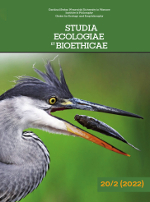The Importance of Plants in Ancient Cultures Against the Background of New Research Concerning Intelligence of Plants
The Importance of Plants in Ancient Cultures Against the Background of New Research Concerning Intelligence of Plants
Author(s): Agnieszka TańczukSubject(s): Religion and science , Human Ecology, History of Religion
Published by: Wydawnictwo Naukowe Uniwersytetu Kardynała Stefana Wyszyńskiego w Warszawie
Keywords: plants;intelligence;consciousness;senses;human;gods;myth
Summary/Abstract: Juicy fruit, healthy vegetables, herbs for all the ailments, delightful flowers, a shelter under the spreading branches of an old tree - can plants be something more for man, and can they be even equal to him? Where is their place in the world, which is dominated by man and his helpers - animals? This article leads the reader through the thoughts and beliefs of ancient peoples, showing their respect for everything that lives until the modern times, when scientists try to relate the definition of intelligence and consciousness to plants. Myths from various parts of the globe, illustrate how important a role plants had in the past, that they were much more than food, medicine, or refuge. Since the beginning of time, without new technologies, people felt the power of nature and respected the otherness of creatures, wandering with them, step by step, with fear and awe. Plants, though “immobilised”, could create, and decided on the world’s fate, and were messengers between men and other organisms, an essential link, unique and holy. Today, when one can analyse plants’ functions and behaviour, observe how they communicate with the world, using all of the senses not located in specific organs, but spread all over the organism, man starts to notice what his ancestors saw a long time ago: that plants remember, decide, learn and give humans a wide range of opportunities. Having far more senses than man, showing humans a different kind of consciousness and intelligence, not centralised, to which one is used to, but dispersed, though not less efficient, plants are becoming very interesting subjects of scientific research.
Journal: Studia Ecologiae et Bioethicae
- Issue Year: 20/2022
- Issue No: 2
- Page Range: 39-52
- Page Count: 14
- Language: English

